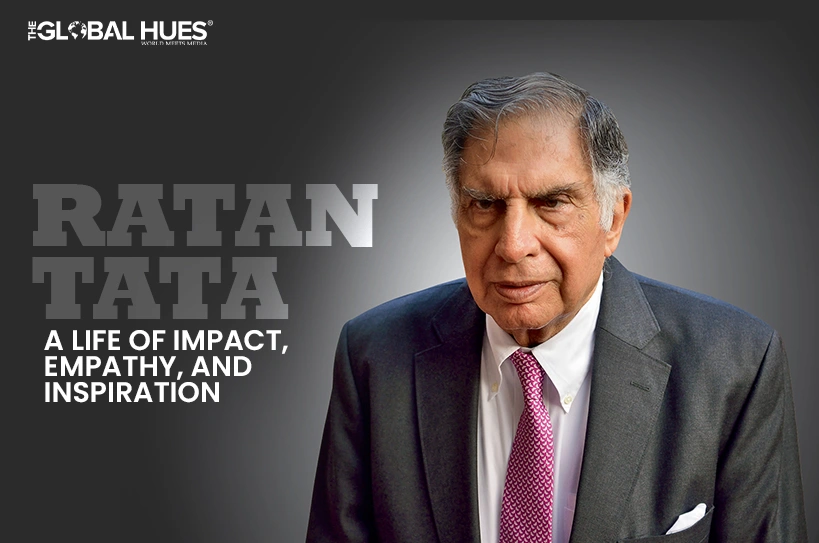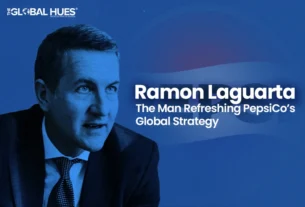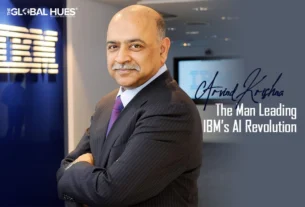“Business needs to go beyond the interest of their companies to the communities they serve.”
Ratan Tata
The revered Indian industrialist, philanthropist, and former chairman of the Tata Group, Ratan Tata, has passed away at the age of 86 and left behind a transformative legacy in business and society. He was a visionary leader who steered the Tata Group for over two decades. Ratan Tata is credited with turning the family-run conglomerate into a global powerhouse, expanding its reach through landmark acquisitions such as Jaguar Land Rover, Corus, and Tetley.
He was known not only for his business acumen but also for his humility, compassion, and commitment to ethical leadership. Ratan Tata was a rare figure whose influence touched the lives of millions through his philanthropic efforts and unwavering dedication to social causes. In this article, we will explore the life of this legendary yet humble businessman.
Early Life
Born in December 1937 in Bombay, British India (present-day Mumbai), Ratan Tata is the son of Naval Tata and Sooni Commissariat. When he was 10, his parents separated, and his grandmother Navajbai Tata formally adopted him. He was raised with his half-brother Noel Tata (son of Naval Tata and Simone Tata).
Ratan Tata faced a lot of teasing and humiliation at school because his parents were divorced, which was uncommon at the time. Growing up without a traditional family, his grandmother raised him and instilled in him strong values and ethics He remembers how she taught him the importance of always expressing his opinions, but doing so in a respectful and dignified way.
He went to Campion School, followed by Cathedral and John Connon School, Mumbai. Some years were also spent in the Bishop Cotton School of Shimla. In 1959 he received a degree in Architecture from Cornell University. Right after college he took up a job and spent some of his best years in Los Angeles. In one of the interviews, he revealed that he had fallen in love with a girl in Los Angeles. However, the relationship had to end as her parents did not allow her to visit India with him when he had been unexpectedly summoned due to his grandmother’s failing health.
Journey With Tata Group
The success story of Ratan Tata started taking shape in 1961 when he returned to India and joined the Tata Group. He was initially appointed to work with Tata Steel Limited in Jamshedpur where he worked under different departments within 6 months. In one of the interviews, he revealed that the other employees perceived him as a part of the Tata family and did not hold him accountable for anything. He claims to have spent 6 months simply trying to make himself ‘look’ useful.
Ratan Tata worked with furnaces and shovelled limestones as an apprentice on the shop floor. After acquiring that experience, he became the director of National Radio and Electronics (NELCO). Initially, he succeeded in elevating the company out of a slump but owing to an economic slowdown, the company collapsed again.
Afterwards, he was handed over another sinking company to save – the Mumbai-based Empress Mills. However, the management’s refusal to allow an investment of 50 lakhs in it and the textile worker’s strike eventually led to its complete shutdown in 1986. He was finally appointed the chairman of Tata Industries in 1991 by JRD Tata.
This came as a surprise to many as there were a bunch of other, more established, and competent executives in the race to become the successors. Some of them are – Russy Mody of Tata Steel, Ajit Kerkar of Taj Hotels, Darbari Seth of Tata Tea, and Tata Chemicals. Many of them openly protested against the appointment of Ratan Tata, calling it a clear case of nepotism.
Major Reforms Under Ratan Tata’s Leadership
Even though the media branded Mr. Ratan Tata as the wrong choice, he continued to work with perseverance and dedication. Additionally, to improve the organisation, Ratan Tata introduced a retirement age and required all Tata companies to report directly to the group’s head office. His leadership helped unite all the Tata companies and make them more efficient.
During his time, Tata Group exited businesses like textiles, cement, and cosmetics while expanding into telecommunications, software, retail and finance. Furthermore, in his 21 years of tenure as the Chairman of the Tata Group, the company’s revenue grew more than 40 times, and profits increased over 50 times. He guided the company in making significant global acquisitions, including Tetley Tea, Jaguar Land Rover, and Corus Steel, transforming it from a mainly Indian company into a global player. He also developed the idea for the Tata Nano, an affordable car aimed at the average Indian consumer.
Key Companies In Tata Group
| Company Name | Founded & Acquired |
| Air India | 1932 & 2022 |
| Tata 1MG | 2015 |
| Tata Industries | 1868 |
| Tata Motors | 1945 |
| Tata Steel | 1907 |
| Tata Elxsi | 1989 |
| Tata Consultancy Services | 1968 |
| Tata Technologies | 1989 |
| Tata Interactive Systems | 1990 |
| Tata Teleservices | 1996 |
| Tata Communications | 1986 |
| Tata SIA Airlines | 2013 |
| Indian Hotels | 1902 |
| Tata AIG | 2001 |
| Tata Housing | 1984 |
| Tata Power | 1915 |
| Trent | 1998 & 2008 |
| Voltas | 1954 |
| Titan | 1984 |
| Tata Chemicals | 1939 |
| Land Rover | 1978 & 2008 |
| Jaguar | 1922 & 2008 |
Ratan Tata’s Sweet Revenge On Ford
Ratan Tata’s dream of creating an all-Indian passenger car and entering the vehicle market came true in 1998 with Tata Motors Indica. Unfortunately, it proved to be a total failure and put a lumpsum financial burden on the Tata Group within the first year of its launch. The company Ford expressed its interest in buying the drowning venture and invited Ratan Tata and his officials for a team meeting in Detroit regarding the same.
The three-hour meeting proved that Ford had simply feigned interest in buying the company. There was much humiliation that Ratan Tata had to face at the hands of the Ford officials who shamed him for getting into the passenger vehicle venture without complete knowledge about it. The deal was called off and the humiliation stayed with him for a long time.
After returning to Mumbai, he researched the vehicle industry for a few years and finally came up with the Indica V2-which initially faced criticism at the hands of auto analysts but its powerful engine, brilliant fuel economy, and great marketing technique contributed to making it a best seller. Ironically, as Ford was staggering into bankruptcy a few years later, Ratan Tata took over the company’s iconic brands- Land Rover and Jaguar for 2.3 billion dollars.
Net Worth Of Ratan Tata
Indian business tycoon Ratan Tata’s net worth is Rs 3,800 crore as of October 2024. 66 per cent of the company’s and family’s fortune goes to charity. Ratan Tata via his relentless contribution to the nation, has proved that being on the Forbes Billionaires List doesn’t make one rich. What matters at the end is how much you are able to give back to the society.
Read More: Top Philanthropists Transforming Lives Through Donations
Ratan Tata Investment In Goodfellows
Ratan Tata has invested an undisclosed amount in Goodfellows, a for-profit start-up that aims to provide companionship for senior citizens in India. Founded by Shantanu Naidu, General Manager at Tata’s office, the startup promotes friendship between senior citizens and young graduates.
During the launch of Goodfellows in August 2022, Ratan Tata made a heart-touching remark which went viral on social media. He said, “You do not know what it is like to be lonely until you spend time alone wishing for companionship”. As per different reports, the startup, over the past six months, took time to complete a successful beta test. Goodfellows will now be available in Mumbai with Pune, Bangalore, and Chennai.
Trustee Of PM Cares Fund
Ratan Tata along with former Supreme Court judge KT Thomas, and former deputy Lok Sabha speaker Kariya Munda became the trustees of PM Cares Fund (Prime Ministers Citizen Assistance and Relief in Emergency Situations Fund). Prime Minister Narendra Modi said that the appointment of new Trustees and Advisors will provide wider perspectives on the operations and functioning of the PM CARES Fund.
Philanthropic Activities
Ratan Tata could have easily been the richest person in India if he was not involved in various philanthropic activities. Tata Hall based in California is known to coordinate research between San Diego and India to assist infrastructural development in combating vector-borne diseases.
It is the result of a generous 70 million dollar gift from Tata Trusts. Tata Education and Development Trust is a philanthropic venture of the Tata group which provides a 28 million dollar scholarship fund for undergraduates in India to study at Cornell University.
The group has also donated 50 million dollars for the construction of an executive centre at Harvard Business School. TCS donated around 35 million dollars to Carnegie Mellon University. Also, the Tata group formed the Tata Centre of Technology and Design at the Massachusetts Institute Of Technology to assist the problems faced by resource-constrained groups, especially in India. Ratan Tata has also provided relief to the victims and their families during the 26/11 Taj Hotel attack.
He has received around 40 awards from various prestigious institutions including the Padma Bhushan in 2000 and Padma Vibhushan in 2008, the third and second-highest civilian honours offered by the Indian Government.
Ratan Tata’s Love For Dogs
Ratan Tata’s Instagram posts often focused on stray animals and their need for care, showing his deep empathy. He worked hard to find loving homes for abandoned pets and made efforts to keep them safe, especially during the monsoon season when stray dogs often seek shelter under cars.
One of his important projects was the Small Animal Hospital in Mumbai (SAHM), the first of its kind in India. This hospital has modern facilities to care for animals. Ratan Tata was very passionate about this initiative, and his commitment to providing quality care for animals showed how dedicated he was to improving the lives of both strays and pets.
Ratan Tata had a strong bond with his dogs, in 2018, he was going to receive a special Lifetime Achievement Award from the British Royal Family. The ceremony was organised by King Charles III (then Prince Charles) and the British Asian Trust to recognise Ratan Tata’s charity work. Although Ratan Tata said that he would attend, he decided to stay home to take care of his sick dog. Businessman Suhel Seth shared the story, recalling how Tata explained, “Tango and Tito, my dogs—one of them is very sick. I can’t leave him.”
The Bottom Line
Ratan Tata’s life and career epitomise the blend of visionary leadership and social responsibility, transforming the Tata Group into a global powerhouse while championing ethical business practices. His unwavering commitment to philanthropy and community welfare, particularly through initiatives aimed at supporting the underprivileged and caring for animals, reflects his belief that business should serve a greater purpose beyond profit.




